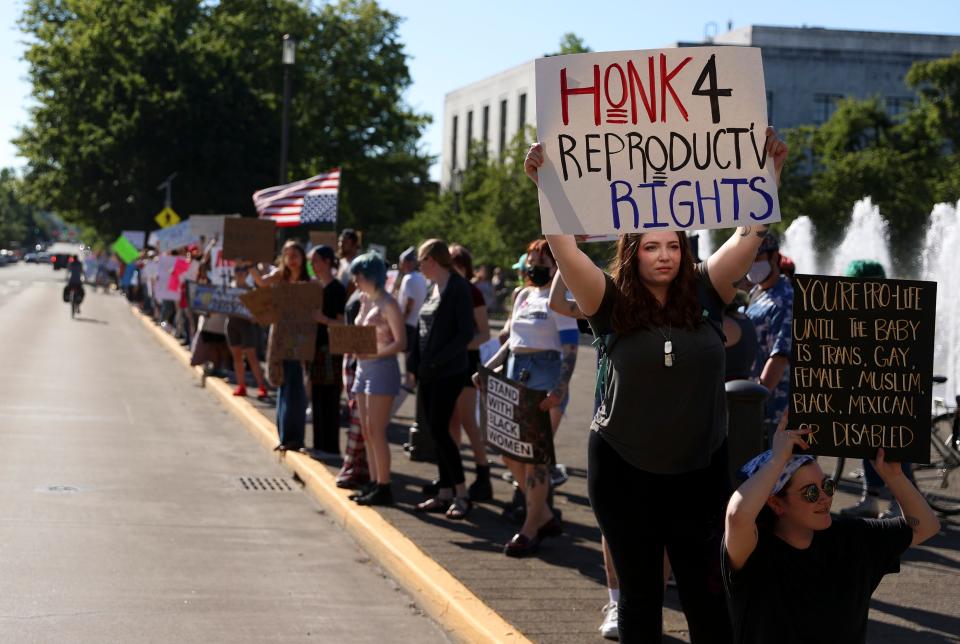After Roe, Oregon advocates look to protect other privacy-based rights
- Oops!Something went wrong.Please try again later.
In the days since the U.S. Supreme Court overturned Roe v. Wade and ended the nation's constitutionally protected right to an abortion, advocates for privacy, reproductive health and LGBTQ rights have raised concerns about other rights that might be at risk based on the opinion and a concurring opinion by Associate Justice Clarence Thomas.>
In Oregon, those concerns have resulted in at least a pair of work groups focused on how the state can solidify certain rights, including access to contraceptives and marriage for same-sex couples, which Thomas called on the Supreme Court to "reconsider" since they were decided under a similar legal framework as Roe.
"In future cases, we should reconsider all of this court’s substantive due process precedents, including Griswold, Lawrence, and Obergefell," Thomas wrote, referring to landmark opinions that blocked states from banning contraception, sex by same-sex couples and marriage of same-sex couples.
"After overruling these demonstrably erroneous decisions, the question would remain whether other constitutional provisions guarantee the myriad rights that our substantive due process cases have generated," Thomas wrote.

No other justices joined Thomas in his concurrence, with some conservative justices explicitly writing the Roe ruling does not put those other rights into jeopardy. That did little to mollify progressive advocates or the liberal justices.
“It seems to say: This is what we’re coming after next," executive director of Basic Rights Oregon Nancy Haque said. “It’s really hard not to see that the Supreme Court has a far-right, pretty marginal agenda that they’re going after right now."
Basic Rights Oregon is one member of the Reproductive Health and Access to Care work group that was formed after a draft of Associate Justice Samuel Alito's opinion on Roe was leaked in May.
Roe v. Wade overturnedHow the Supreme Court decision impacts Oregon
The workgroup — which consists of progressive advocates, health care providers and state political leaders — was tasked with preparing policy and budget proposals for the 2023 session to expand and protect access to reproductive and gender-affirming care.
They said this work is additionally critical because Oregon is becoming a destination for individuals seeking this kind of care, particularly from states that will soon ban abortions like Idaho.
“Justice Alito’s draft opinion has made clear that many freedoms are no longer safe, including basic access to contraceptives,” Rep. Travis Nelson, D-Portland, said in a statement at the time. “We have to prepare for a future in which opponents of reproductive freedom are committed to turning the clock back even further. It’s outrageous and unprecedented, and we will be prepared if these nightmares become reality.”
A separate work group is looking into filing an initiative to amend the Oregon constitution to remove a portion that defines marriage as between one man and one woman. While this is still in the constitution, it was deemed unconstitutional by a U.S. federal district court judge in 2014 and is no longer enforced. This ruling came more than a year before the Supreme Court ruled the right to marry is guaranteed by the U.S. Constitution in Obergefell.
It's unclear if individuals would try to get the initiative on the November 2024 ballot, which is the earliest it could be put before voters.
Haque said that while there is reason to be concerned that these rights could soon be "up for debate" once more, there is no immediate risk to same-sex couples. The earliest a case could be brought before the Supreme Court on this topic would be 2024.
“Right now, there’s a lot of will among elected officials in Oregon to protect LGBTQ equality,” Haque said. “I don’t have any immediate fears about what’s next.”

Even if that portion of the constitution is not removed, Oregon could be buffered more than other states. This was also the case with Roe v. Wade, where Oregon law had already contained the abortion access protections, including through the state's Reproductive Health Equity Act of 2017.
With marriages, the 2014 Gieger federal district court decision was based on a different legal framework than the 2015 Obergefell decision. Instead of basing the decision on a right to privacy (as the Supreme Court justices did), it drew on the Equal Protection Clause.
The Constitution doesn’t explicitly guarantee a right to abortion, but a 7-2 majority in Roe v. Wade held that the 14th Amendment’s protection of "liberty" includes the right to terminate a pregnancy.
In Griswold v. Connecticut, the Supreme Court invalidated a law that forbids contraception, finding the Bill of Rights created "zones of privacy" for married couples. Decades later, in 2015, the court relied on a similar theory in Obergefell v. Hodges that legalized marriage for same-sex couples nationally and a 2003 ruling in Lawrence v. Texas that invalidated state prohibitions on sodomy.
Those rights were based on a similar approach to the Constitution, that the 14th Amendment provides for some rights — such as privacy — that are not explicitly stated in the founding document.
USA Today reporters John Fritze and Marina Pitofsky contributed to this article.
Reporter Connor Radnovich covers the Oregon Legislature and state government. Contact him at cradnovich@statesmanjournal.com or 503-508-6131, or follow him on Twitter at @CDRadnovich.
This article originally appeared on Salem Statesman Journal: After Roe, Oregon advocates look to protect privacy-based rights

